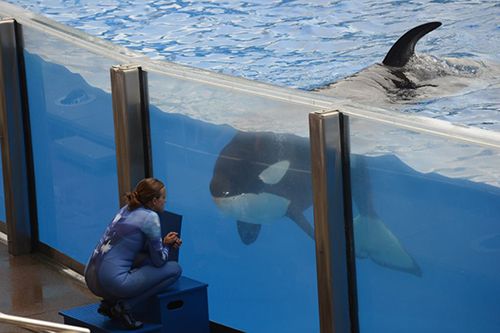Gov. Brown signs captive orca ban
by James Poulos | September 15, 2016 5:34 pm
 Capping off a protracted political battle focused around animal rights and aquatic entertainment at SeaWorld, the San Diego’s longstanding tourist attraction, Gov. Jerry Brown signed legislation that will bring California’s iconic relationship with captive orcas to an end.
Capping off a protracted political battle focused around animal rights and aquatic entertainment at SeaWorld, the San Diego’s longstanding tourist attraction, Gov. Jerry Brown signed legislation that will bring California’s iconic relationship with captive orcas to an end.
Wave of criticism
Authored by Assemblyman Richard Bloom, D-Santa Monica, the law has banned “orca breeding and captivity programs like the one formerly run by SeaWorld theme parks,” as well as “featuring the marine mammals […] in performances for entertainment purposes,” the Los Angeles Times reported[1]. “Starting in June next year, orcas in captivity can be used for ‘educational presentations’ only.”
For the activists who spearheaded the legislation, inspired by the 2013 documentary Blackfish, victory in California has been seen as critical to codifying new nationwide norms. “Attendance has plunged, and company shares have fallen in half” at SeaWorld, the San Francisco Chronicle noted[2] last year, after the film “made a compelling case that the confinement and exploitation of killer whales inflicted physical and psychological stress on creatures that thrive on socialization and vast expanses of the ocean.” The Animal Welfare Institute, which co-sponsored the bill, helped ensure that practices banned in California could not spread to other locales after the fact. “Besides outlawing orca breeding and theatrical performances, the so-called Orca Protection Act also bans the transportation of orcas to entertainment facilities in other states and foreign countries,” National Geographic noted[3]. But it “does permit the transport of orcas to other facilities in North America,” as Dr. Lori Marino, president of the Whale Sanctuary Project, told NatGeo. “This will facilitate ongoing efforts to develop seaside sanctuaries for these animals as an alternative to living in tanks.”
Multiple challenges
The route taken through Sacramento by the captivity ban was an unusual one. After the passage of this year’s budget package, “the Assembly approved a natural resources budget ‘trailer bill’ that includes a provision with the new restrictions,” the Sacramento Bee recalled[4]. “The orca provision is part of a budget-related bill that would be wrapped into the $171-billion state budget the governor signed in June,” as U-T San Diego observed[5] as the state Senate cleared the legislation. Bloom’s bill, with similar wording, advanced simultaneously.
Looking ahead
Given SeaWorld’s timing in shuttering its beleaguered orca programs, the bill’s completed journey into law ruffled few feathers. In a March op-ed at the Times, Joel Manby, SeaWorld president and CEO, revealed that public sentiments the company had ironically helped change in orcas’ favor had doomed its traditional offerings. “We are proud of contributing to the evolving understanding of one of the world’s largest marine mammals,” he wrote. “Now we need to respond to the attitudinal change that we helped to create — which is why SeaWorld is announcing several historic changes. This year we will end all orca breeding programs[6] — and because SeaWorld hasn’t collected an orca from the wild in almost four decades, this will be the last generation of orcas in SeaWorld’s care. We are also phasing out our theatrical orca whale shows.”
Opposition had been closing in around SeaWorld throughout this year and last. The California Coastal Commission had approved a plan to expand SeaWorld’s orca enclosures, but only on the condition that the park stopped its breeding and transfer programs, effectively forcing the changes Manby announced in March. In Washington, D.C., meanwhile, Rep. Adam Schiff, D-Calif., had authored a bill imposing a federal ban on the captive breeding of orcas. “SeaWorld is certainly feeling the bite of public opinion,” ecological author Carl Safina told NatGeo. “Though they could carry on elsewhere with breeding and trans-shipping, they’d be wise to emphasize other aspects of their entertainment.”
- reported: http://www.latimes.com/politics/essential/la-pol-sac-essential-politics-updates-california-bans-orca-captivity-and-1473800196-htmlstory.html
- noted: http://calwatchdog.com/2015/11/13/seaworld-drop-san-diego-orca-shows/
- noted: http://voices.nationalgeographic.com/2016/09/23/california-bans-orca-breeding-and-entertainment-seaworld-feels-the-bite-of-public-opinion/
- recalled: http://www.sacbee.com/news/politics-government/capitol-alert/article84493927.html
- observed: http://www.sandiegouniontribune.com/sdut-whale-breeding-ban-goes-to-govenor-2016aug26-story.html
- This year we will end all orca breeding programs: http://www.latimes.com/business/la-fi-seaworld-ends-killer-whale-breeding-20160317-story.html
Source URL: https://calwatchdog.com/2016/09/15/gov-brown-signs-captive-orca-ban/